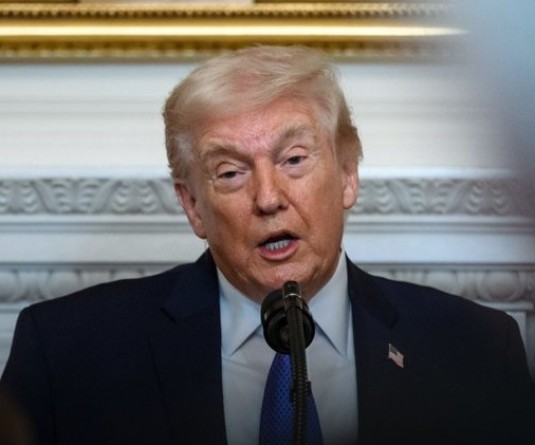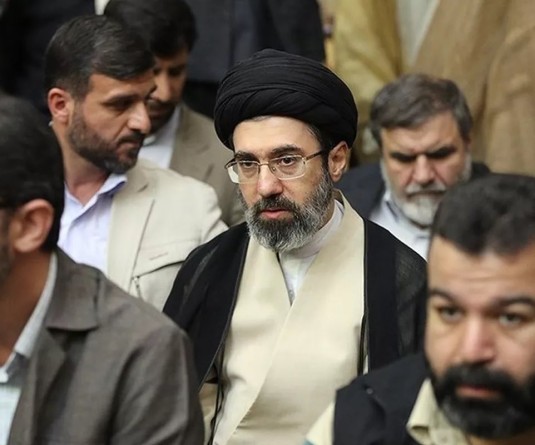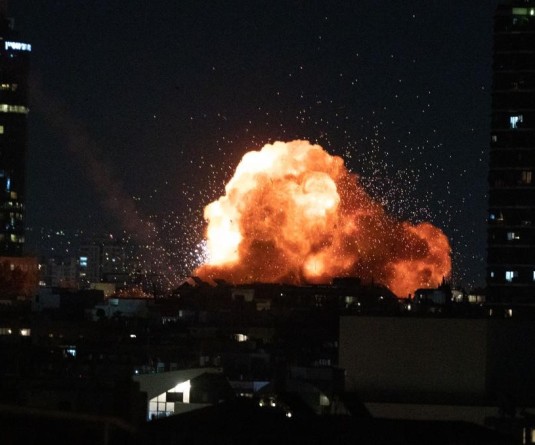
An Egyptian holds up newspaper fronted with a picture of former President Hosni Mubarak and the Arabic headline, "Finally he steps down", at Tahrir Square in Cairo, Egypt, February 12. Egypt exploded with joy, tears, and relief after pro-democracy protesters brought down President Hosni Mubarak with a momentous march on his palaces and state TV. Mubarak, who until the end seemed unable to grasp the depth of resentment over his three decades of authoritarian rule, finally resigned Friday and handed power to the military. (AP Photo)
CAIRO, February 12 (AP): Egyptian protesters were jubilant Saturday over their success in ousting President Hosni Mubarak, but many vowed to stay camped in a central Cairo square until they hear "clear assurances" that the military will meet their demands for democracy.
Burnt-out vehicles were towed away while people, including young activists wearing surgical masks, swept the streets and hauled away mounds of trash. Soldiers removed barricades to open at least a road leading to Tahrir, or Liberation, Square after a night of euphoric celebration and nearly three weeks of protests that forced Mubarak to surrender power to the military. Many wore placards saying "Sorry for the inconvenience, but we're building Egypt."
Protesters were divided about how long to stay, and people were still entering the square through checkpoints. Some took down their makeshift tents, returning blankets donated by Islamic charities and heading home. Others vowed to stay put until the military, which has pledged to shepherd reforms for greater democracy, issues a promised statement on its next steps. Those could include the dissolution of parliament, creation of a presidential council and a transitional government.
The Supreme Council of the Armed Forces has issued three communiques so far, and the fourth was expected soon to announce the military's plans. "We have to see how the army will orchestrate a democratic transfer of power. We have to wait and see," said Ali Mohammed, a sales manager camped out on the square. Under a banner reading "the people managed to oust the regime," two other protesters argued about whether to clear the downtown square near the famed Egyptian museum.
Khaled Abdel-Hamid, a member of a coalition of groups behind the protests, said they have no unified leadership to determine when they should leave. But he said there was a consensus that the square would not emptied until the army speaks again. "The army hasn't laid out exactly what it intends to do in the coming days, therefore, we are here and will remain here," Abdel-Hamid said.
Shopkeeper Gomaa Abdel-Maqsoud says he's been in Tahrir Square since the protests began on Jan. 25 and is ready to go. He says "I have never seen such happiness in peoples' faces before; what else do I want?" he asked. Nadal Saqr, a university professor, insisted protesters should stay until the army offers "clear assurances" that their demands for democracy are met.
Elsewhere, Egyptians in coffee houses and on the street scoured newspapers for details about the astonishing events from the day before - when hundreds of thousands marched on Mubarak's palaces in Cairo and Alexandria and besieged state TV, leading the military to effectively carry out a coup at the please of protesters. Pro-government papers along with state-run TV and radio, which had long been forced to toe the ruling party line, shifted their editorial policy and congratulated the Egyptian people.
The once pro-Mubarak paper Al-Ahram daily ran a front page headline declaring "the people ousted the regime. The Egyptian youth forced Mubarak to leave. Egyptians have been celebrating until morning, with victory in the first popular revolution in their history.
Burnt-out vehicles were towed away while people, including young activists wearing surgical masks, swept the streets and hauled away mounds of trash. Soldiers removed barricades to open at least a road leading to Tahrir, or Liberation, Square after a night of euphoric celebration and nearly three weeks of protests that forced Mubarak to surrender power to the military. Many wore placards saying "Sorry for the inconvenience, but we're building Egypt."
Protesters were divided about how long to stay, and people were still entering the square through checkpoints. Some took down their makeshift tents, returning blankets donated by Islamic charities and heading home. Others vowed to stay put until the military, which has pledged to shepherd reforms for greater democracy, issues a promised statement on its next steps. Those could include the dissolution of parliament, creation of a presidential council and a transitional government.
The Supreme Council of the Armed Forces has issued three communiques so far, and the fourth was expected soon to announce the military's plans. "We have to see how the army will orchestrate a democratic transfer of power. We have to wait and see," said Ali Mohammed, a sales manager camped out on the square. Under a banner reading "the people managed to oust the regime," two other protesters argued about whether to clear the downtown square near the famed Egyptian museum.
Khaled Abdel-Hamid, a member of a coalition of groups behind the protests, said they have no unified leadership to determine when they should leave. But he said there was a consensus that the square would not emptied until the army speaks again. "The army hasn't laid out exactly what it intends to do in the coming days, therefore, we are here and will remain here," Abdel-Hamid said.
Shopkeeper Gomaa Abdel-Maqsoud says he's been in Tahrir Square since the protests began on Jan. 25 and is ready to go. He says "I have never seen such happiness in peoples' faces before; what else do I want?" he asked. Nadal Saqr, a university professor, insisted protesters should stay until the army offers "clear assurances" that their demands for democracy are met.
Elsewhere, Egyptians in coffee houses and on the street scoured newspapers for details about the astonishing events from the day before - when hundreds of thousands marched on Mubarak's palaces in Cairo and Alexandria and besieged state TV, leading the military to effectively carry out a coup at the please of protesters. Pro-government papers along with state-run TV and radio, which had long been forced to toe the ruling party line, shifted their editorial policy and congratulated the Egyptian people.
The once pro-Mubarak paper Al-Ahram daily ran a front page headline declaring "the people ousted the regime. The Egyptian youth forced Mubarak to leave. Egyptians have been celebrating until morning, with victory in the first popular revolution in their history.






